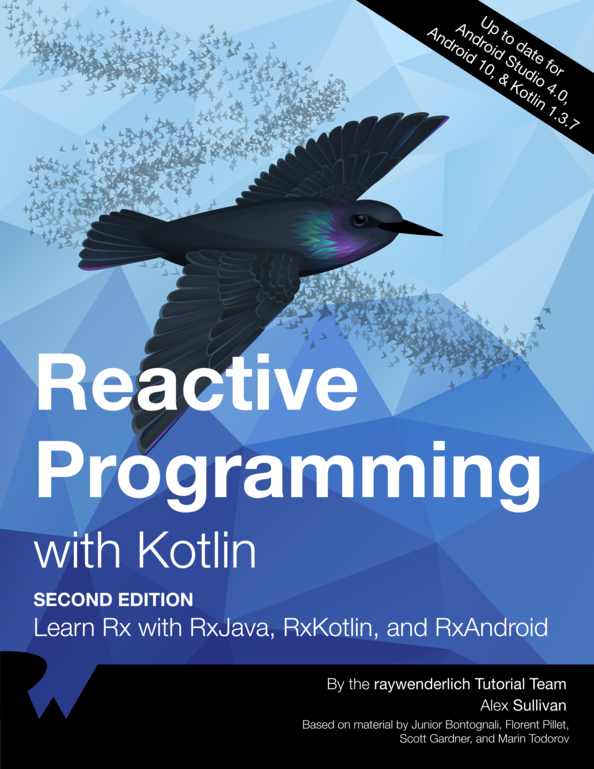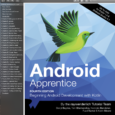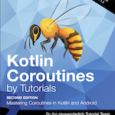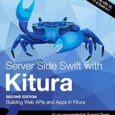
Reactive Programming with Kotlin Ray Wenderlich Book Details
Title: Reactive Programming with Kotlin
Author: Alex Sullivan
Publisher: Ray Wenderlich
Language: English
No. of pages: 831
Format: EPUB, Source code
Recently I bought a set of Android Bundle include 10 Books from Ray Wenderlich. As you can see in the image above, which includes Reactive Programming with Kotlin. And now I want to transfer it to you for $ 60 (10 books) Payment Via Paypal or Bitcoin, All books are the latest version and have full source code, I will share it for you for $ 60 Includes PDF, EPUB file and full source code, you can download on Google Drive. When any book have new version i will get it free for you.
List bundle 10 books: Android Bundle:
1, kotlin apprentice
2, Android apprentice
3, Advanced Android App Architecture
4, Kotlin Coroutines by Tutorials
5, Reactive Programming with Kotlin
6, Saving Data on Android
7, Android Test-Driven Development by Tutorials
8, Data Structures and Algorithms in Kotlin
9, Git Apprentice
10, Advance git
11, App design
Please contact me by Email: truonghang0207@gmail.com.
Thank you
Section I: Getting Started with RxJava – Reactive Programming with Kotlin
In this part of the book, you’re going to learn about the basics of RxJava. You are going to have a look at what kinds of asynchronous programming problems RxJava addresses, and what kind of solutions it offers.
Further, you will learn about the few basic classes that allow you to create and observe event sequences, which are the foundation of the Rx framework.
You are going to start slow by learning about the basics and a little bit of theory. Please don’t skip these chapters! This will allow you to make good progress in the following sections when things get more complex.
Chapter 1: Hello, RxJava!
Chapter 2: Observables
Chapter 3: Subjects
Chapter 4: Observables & Subjects in Practice
Section II: Operators & Best Practices
Operators are the building blocks of Rx, which you can use to transform, process, and react to events emitted by Observables.
Just as you can combine simple arithmetic operators like +, -, and / to create complex math expressions, you can chain and compose together Rx’s simple operators to express complex app logic.
In this chapter, you are going to:
Start by looking into filtering operators, which allow you to process some events but ignore others.
Move on to transforming operators, which allow you to create and express complex data transformations. You can for example start with a button event, transform that into some kind of input, process that and return some output to show in the app UI.
Look into combining operators, which allow for powerful composition of most other operators.
Explore operators that allow you to do time based processing: delaying events, grouping events over periods of time, and more. Work though all the chapters, and by the end of this section you’ll be able to write simple RxJava apps!
Chapter 5: Filtering Operators
Chapter 6: Filtering Operators in Practice
Chapter 7: Transforming Operators
Chapter 8: Transforming Operators in Practice
Chapter 9: Combining Operators
Chapter 10: Combining Operators in Practice
Chapter 11: Time-Based Operators
Section III: Intermediate RxJava
Once you start writing complete apps with RxJava, you will also need to take care of more intermediate topics than simply observing for events and processing them with Rx.
In a full production-quality app, you will need to build an error handling strategy, do more advanced multi-threading processing, create a solid test suite, and more.
In this part of the Reactive Programming with Kotlin book, you will work through five challenging chapters, which will lift your Rx status from a rookie level to a battle-tested warrior.
Chapter 12: Error Handling in Practice
Chapter 13: Intro to Schedulers
Chapter 14: Flowables & Backpressure
Chapter 15: Testing RxJava Code
Chapter 16: Creating Custom Reactive Extensions
Section IV: RxJava Community Cookbook
RxJava’s popularity keeps growing every day. Thanks to the friendly and creative community that formed around this library, a lot of community-driven Rx projects are being released on GitHub.
The advantage of the community-built libraries that use RxJava is that unlike the main repository, which needs to follow the Rx standard, these libraries can afford to experiment and explore different approaches, provide non multi-platform specializations, and more.
In this section you are going to look into just a few of the many community open source projects. The section contains four short cookbook-style chapters that look briefly into four community projects that help you with binding Android Views, talking to your server with Retrofit, persisting preferences data, and handling user permissions.
Chapter 17: RxBinding
Chapter 18: Retrofit
Chapter 19: RxPreferences
Chapter 20: RxPermissions
Section V: Putting It All Together
The “easy” part of the Reactive Programming with Kotlin book is over. If you made it this far and are looking to learn even more in order to start creating production apps with RxJava, this section is for you.
The two chapters in this section are going to help you learn how to build real-life applications with RxJava.
The first chapter will cover integrating RxJava with the components of Android Jetpack, in particular, the Room database library and the Paging library. The chapter will build off of knowledge you’ve gained earlier in the book working with the ViewModel and LiveData components of Jetpack.
The second chapter, and the last one in this Reactive Programming with Kotlin book, is going to show you how to setup a reactive application architecture and how to convert callbacks to Rx Observables.
Once you finish working through this section, you will be one of the top RxJava developers out there. There is, of“course, more to know about Rx but at this point you will be able to figure out things further on your own.
Also, don’t forget to give back to the community! It would not have been possible for us to put this book together without all the amazing Rx folks sharing their knowledge, code, and good vibes.
Chapter 21: RxJava & Jetpack
Chapter 22: Building a Complete RxJava App



